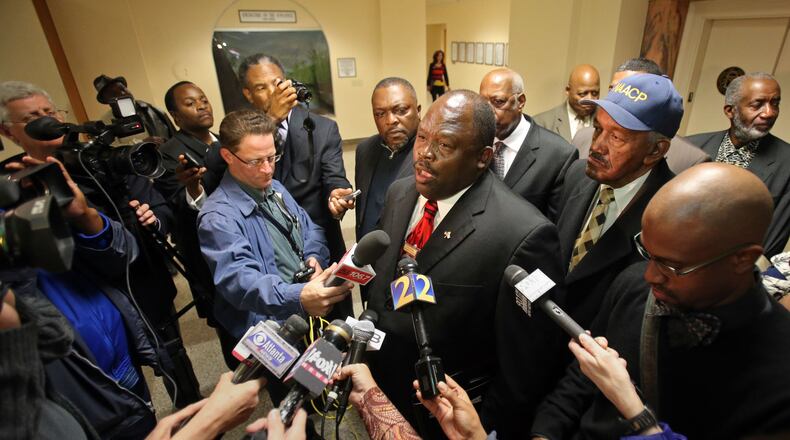A meeting between Gov. Nathan Deal and leaders of several civil rights organizations took a fiery turn on Monday during discussions on whether Deal should be specifically seeking black candidates to replace DeKalb County’s ousted school board members.
The specter of race, long an undercurrent in debate over the majority-black board’s future, burst into the forefront as the head of the state NAACP chapter and other groups complained that Deal told them to “find some good black people to run” during the closed-door meeting. They said Deal was implying that finding qualified black candidates would be difficult.
Deal’s spokesman, Brian Robinson, didn’t dispute the remarks, but said they were part of a broader discussion over replacing the six suspended members, five of whom are black. Two of the three remaining members, who were allowed to stay because they were recently elected, are white.
Robinson said the governor was encouraging the groups to find qualifying candidates for the 2014 elections, and that the governor noted that DeKalb students he spoke with last week brought up academic, not racial, concerns in questioning Deal about his decision.
“The governor said to please get involved and make sure these black candidates are good black candidates so we can have a functioning board,” said Robinson. “Gov. Deal wants to make sure every student graduates in schools that have kept their accreditation.”
DeKalb is one of the nation’s wealthiest majority-black counties, but it has long wrestled with a racial split between the predominantly white northern suburbs and the rest of the county. The turmoil at the school board has prompted some north DeKalb residents to support breakaway school districts for their communities.
Deal suspended two-thirds of the DeKalb school board last month after an accrediting agency produced a report portraying a dysfunctional body rife with nepotism, infighting and questionable financial decisions. The Republican said he was uneasy with intervening in an overwhelmingly Democratic county, but that he took action because he feared metro Atlanta’s economy would otherwise suffer.
A nominating panel worked through the weekend to vet more than 400 candidates who are seeking the spots. So far, they have interviewed about 60 top contenders, and members hope to have a list of 12 finalists to Deal later this week. In the meantime, the three remaining board members can’t make legal quorum to vote on key decisions.
DeKalb Superintendent Michael Thurmond, who was appointed earlier this year, said he’s staying out of the board selection process and instead focused on day-to-day administration. He said he’ll work with whomever the governor taps to try to retain the district’s accreditation.
“I’m expecting by the end of the week to have a quorum, which is at least five if not nine” members, said Thurmond.
The five-member nominating panel has said it will weigh each candidate’s race and background as it decides who will lead Georgia’s third-largest school system. Each applicant will be rated on how they “represent the diversity of the community,” along with their education experience and vision for the system, according to a scoring document.
Participants in Monday’s meeting, which included the governor and his aides and several members of the NAACP and other civil rights groups, said the discussion started amicably but took a turn when the governor was pushed to select black candidates for the six seats. That’s when he urged them to find “good black people” to run, participants said.
“That’s a very insensitive, inflammatory and down-right negative thing to say,” said Marcus Coleman of the National Action Network’s Atlanta chapter.
Robinson, the governor’s spokesman, said the group made its own demand, arguing that voters should pick whomever they want and “should live with the consequences if they choose ‘bad apples.’”
“The governor said if he did nothing, the victims would be innocent children. They basically told him they were fine with that,” said Robinson. “That view doesn’t match that of the county’s parents and students — and that’s who the governor is fighting for.”
But Edward DuBose, who heads the state NAACP chapter, said the conversation was more nuanced. He said he reminded Deal of the plight of civil rights icon Medgar Evers and others who sacrificed their lives to give disenfranchised blacks the right to vote.
“We believe the right of the people to choose their own leaders should not be tampered with. The issue here is whether the governor should act like a dictator,” said DuBose.
About the Author
Keep Reading
The Latest
Featured


